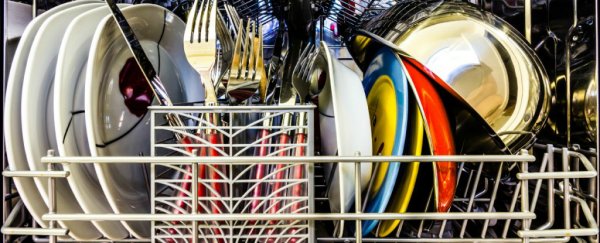It's a very human trait to assume that, no matter how far we advance technology, machines will never be able to replace our skills.
Take doing the dishes for example: the first dishwasher was built back in 1850, but more than 150 years later, and many of us still do our dishes ourselves, or at least take the time to pre-wash them before loading them into a dishwasher.
But according to the stats, modern dishwashers are now officially faster, more hygienic and way better for the environment that we'll ever be. So maybe it's finally time to give in and let the machines take over.
Or as Consumer Reports puts it, it's time to just "let the dishwasher do its job".
There's still the prevailing myth that washing by hand is cleaner and better for the environment - particularly if you manage to use just one sink-full of water for a whole family's worth of dishes.
But research shows that this isn't the case anymore, with dishwashers becoming not only far cheaper to run, but also much more water- and energy-efficient.
"While it may be possible to use less water/energy by washing dishes by hand, it is extremely unlikely," Jonah Schein, the technical coordinator for homes and buildings from the Environmental Protection Agency's WaterSense program, referring to Energy Star-certified dishwashers, said in a statement.
"In order to wash the same amount of dishes that can fit in a single load of a full size dishwasher and use less water, you would need to be able to wash eight full place settings and still limit the total amount of time that the faucet was running to less than two minutes," he adds.
OK we get it - it's hard to use less water than a machine. But surely we still need to give dishwashers a helping hand by giving dishes a quick rinse before loading them in?
Unfortunately not, according to Steven Nadel, the executive director of the American Council for an Energy Efficient Economy. In fact, if you've got a modern dishwasher, it's totally unnecessary to do anything but scrape the food scraps off plates.
"Old dishwashers, to generalise, didn't get dishes very clean unless you pre-washed," Nadel told Chris Mooney over at The Washington Post back in 2015.
"The new dishwashers, that is not an issue. Almost all of them have what's called soil sensors. Depending on how dirty the dishes are, they will wash more or less. They will get the dishes clean."
Dishwashers can also spray highly controlled jets of water upwards of 60 degrees Celsius (140 Fahrenheit) at the dishes, something our human hands can't handle - although experts recommend you only need to set it as high as around 48 degrees Celsius (120 Fahrenheit).
"The worst approach for the environment - and energy and water bills - is pre-washing dishes in constantly running hot water and then running them in an ancient dishwasher that was not built to modern standards," wrote Mooney.
In fact, by pre-washing our dishes, Consumer Reports suggests that households could be wasting more than 22,000 litres (6,000 gallons) of water per year.
Still not convinced that a machine can do household chores better than you? Well, we hate to tell you this, but you're literally wasting your life.
The Energy Star program has worked out that handing over all dishwashing responsibilities to a machine saves you 230 hours, or nearly 10 days, each year. Which makes for a pretty compelling argument.
So what are you going to do with all your newly found spare time? Why not make yourself useful and work on some environment-helping citizen science projects, or help edit some of the breathtaking raw footage of Jupiter taken by NASA's Juno probe. Who said technology didn't need us?
A version of this story was first published in May 2015.
